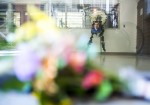Angie Castillo and William Klug had their routine chat Wednesday morning, as if it were just another day.
Moments later, she returned to her office and heard two gun shots. Castillo, management services officer of the aerospace and mechanical engineering department, was the first to dial 911 and report the gunshots.
Distinguished professor Nasr Ghoniem darted toward Castillo’s office, worried she was hurt. Castillo appeared in the doorway shortly after.
“It’s Bill,” she said.
Former UCLA doctoral student Mainak Sarkar killed Klug, a professor of mechanical and aerospace engineering, in Klug’s office before ending his own life. Klug, a husband and father to two children, was 39.
After Sarkar fired the first two shots, faculty members left their offices to find out what happened.
Professor and department chair Tsu-Chin Tsao said he entered the halls and saw Christopher Lynch’s face change as he realized Klug was not standing with them.
“If you knew Bill, it was absolutely impossible he had done something like this,” said Lynch, a professor of aerospace and mechanical engineering.
Lynch grabbed Klug’s office door handle to hold it shut, and yelled for faculty members and students to clear the hallway. He said he didn’t hear voices in the office, and no one tried to open the door.
“I couldn’t tell if it was for five seconds or five minutes,” he said.
They stood motionless as the last shot fired in Klug’s office rang through the halls. Lynch said it sounded like a plate breaking, and Castillo said she heard someone fall.
Tsao and Castillo returned to Tsao’s office, while Lynch stayed behind in the hallway. Ghoniem and one of his postdoctoral students planned to check on students in their lab, but the student stayed back with Lynch.
“It felt wrong leaving him,” he said.
The student said he would like to remain anonymous to avoid being contacted by other organizations.
Tsao motioned to Lynch, asking him to move out of harm’s way and join himself and Castillo in his office, but Lynch refused. Lynch said some of his colleagues stood their ground in the hallway around him.
“I had to argue with them, asking them to leave,” Lynch said. “No one wanted to go.”
Lynch told Ghoniem he’d take his chances – he would give faculty and students 15 seconds to clear the hallway, before running himself.
He said he didn’t realize the danger he was in even as he met police at the stop of the stairwell. Lynch handed his office key to officers so they could enter locked rooms, and left to check on students locked in the third floor labs.
Professor Ajit Mal, who ran into the hallway with Lynch after the two initial shots, said he didn’t register the events as they happened. Instead, Mal instinctively walked down the hallway, coffee cup in hand, to check on his students.
Days later, faculty members still could not detail the timing of the events that morning.
“It’s like our memories are frozen in time,” Ghoniem said.
After an investigation of the crime scene, police found Sarkar’s suicide note in Klug’s office. The note led them to Sarkar’s Minnesota home, where they found a kill list that names Klug, another UCLA professor and Sarkar’s wife.
Sarkar accused Klug of stealing his code and giving it to another student in a blog post he allegedly authored in March.
Ghoniem, who has since reviewed Sarkar’s doctoral thesis, said the software code in Sarkar’s paper wasn’t anything commercial codes couldn’t solve.
Bill Kisliuk, spokesman for the Henry Samueli School of Engineering and Applied Science, said it is common knowledge intellectual property developed in UCLA labs belongs to the university.
Klug returned to UCLA as a faculty member in 2003 after earning his master’s degree in civil engineering from UCLA in 1999. He also led the Klug Research Group, which studies theoretical and computational biomechanics.
Engineering school officials announced Wednesday the school created a memorial fund in his honor. Donations to the fund will benefit Klug’s immediate family.
